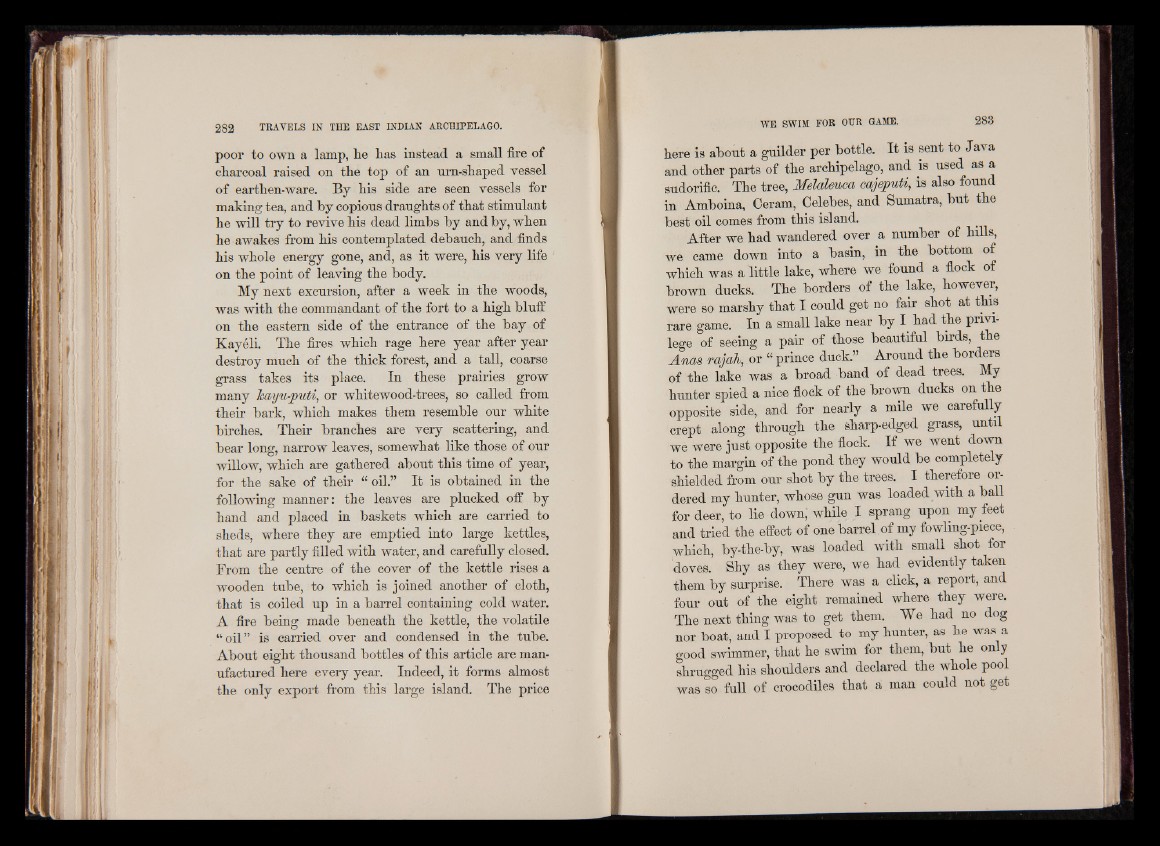
poor to own a lamp, lie lias instead a small fire of
charcoal raised on the top of an nm-shaped vessel
of earthen-ware. By his side are seen vessels for
making tea, and by copious draughts of that stimulant
he will try to revive his dead limbs by and by, when
he awakes from his contemplated debauch, and finds
his whole energy gone, and, as it were, his very life
on the point of leaving the body.
My next excursion, after a week in the woods,
was with the commandant of the fort to a high bluff
on the eastern side of the entrance of the bay of
Kayeli. The fires which rage here year after year
destroy much of the thick forest, and a tall, coarse
grass takes its place. In these prairies grow
many Icayu-puti, or whitewood-trees, so called from
their bark, which makes them resemble our white
birches. Their branches are very scattering, and
bear long, narrow leaves, somewhat like those of our
willow, which are gathered about this time of year,
for the sake of their “ oil.” It is obtained in the
following manner: the leaves are plucked off by
hand and placed in baskets which are carried to
sheds, where they are emptied into large kettles,
that are partly filled with water, and carefully closed.
From the centre of the cover of the kettle rises a
wooden tube, to which is joined another of cloth,
that is coiled up in a barrel containing cold water.
A fire being made beneath the kettle, the volatile
“ oil” is carried over and condensed in the tube.
About eight thousand bottles of this article are manufactured
here every year. Indeed, it forms almost
the only export from this large island. The price
here is about a guilder per bottle. It is sent to Java
and other parts of the archipelago, and is used as a
sudorific. The tree, Melaleuca cajeputi, is also found
in Amboina, Ceram, Celebes, and Sumatra, but the
best oil comes from this island.
After we had wandered over a number of hills,
we came down into a basin, in the bottom of
which was a little lake, where we found a flock of
brown ducks. The borders of the lake, however,
were so marshy that I could get no fair shot at this
rare game. In a small lake near by I had the privilege
of seeing a pair of those beautiful birds, the
Anas rajah, or “ prince duck.” Around the borders
of the lake was a broad band of dead trees. My
hunter spied a nice flock of the brown ducks on the
opposite side, and for nearly a mile we carefully
crept along through the sharp-edged grass, until
we were just opposite the flock. If we went down
to the margin of the pond they would be completely
shielded from our shot by the trees. I therefore ordered
my hunter, whose gun was loaded with a ball
for deer, to lie down, while I sprang upon my feet
and tried the effect of one barrel , of my fowling-piece,
which, by-the-by, was loaded with small shot for
doves. Shy as they were, we had evidently taken
them by surprise. There was a click, a report, and
four out of the eight remained where they were.
The next thing was to get them. We had no dog
nor boat, and I proposed to my hunter, as he was a
good swimmer, that he swim for them, but he only
shrugged his shoulders and declared the whole pool
was so full of crocodiles that a man could not get